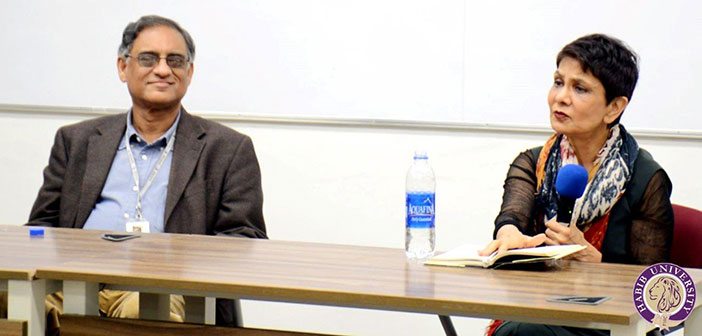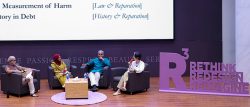Ghalib disseminated by Dr. Azra Raza, in a symphony of verse for Arzu center
HABIB UNIVERSITY: The latest seminar for the Arzu Center for Regional Languages and Humanities took place on December 9th at Habib University, with the topic of discourse being one dear to many with an interest in the art of language.
The Arzu Center invited Dr. Azra Raza, the renowned scientist with a deeply ingrained love of poetry, to speak to the audience about the poetry of Ghalib. Armed with her book of interpretations that she co-authored with Sarah Suleri Goodyear called Epistemologies of Elegance, she took the stage with the moderator of the seminar, Habib University’s own Dr. Asif Aslam Farrukhi.
The speaker initiated the talk, giving the audience a brief history into the research that went into their book of interpretations. Comprised of 21 ghazals that were painstakingly translated and interpreted, Dr. Azra was adamant that each of these interpretations are highly personal, and that “the errors of the reader are simply openings into the rereading of the text”. She would insist that these texts are open to infinite invitations to interpret in one’s own way, and that is indeed what inspires poets to put pen to paper.
Referring to the name of the seminar, the “Interiority of Ghalib’s voice”, she spoke of how the common compliments that go with poetry, such as music or wine, fall away with Ghalib, that their place gets taken by his questioning of physical and metaphysical issues, which is what touches the reader in such a distinct and moving manner. His sense of placement of prose is so powerful and moving, that one cannot help but wonder at the complex means by which Ghalib connects intricacy and demands of passion, allowing them to be open to so many meanings.
“Kya kiya khizr ne sikandar se,
Ab kisay rehnuma karay koi”
Dr. Azra recited this verse to share an example of her interpretation, offering a delicately worded explanation to illuminate and construe the complex illusions to two separate cultures, Greek and Islamic, that once drawn, can be interpreted as a mental disrobement, of how one can’t even trust their own mind, rather than the backstory of Alexander and immortality.
In another example, she passionately defined Ghalib’s discernment of age. “His shair molds the passing way of a unique vitality that drove the poet to be a witness of wonders, there is no longer world enough or time to engage fully and deeply in the commerce of living”. Speaking of her book of interpretations, she also revealed how Ghalib connects mysticism and Sufism in his poetry, the paradox being that he leaves it open to interpretation to the reader.
Questioned about her vast fields of interest, and how she ensures that her passion for science connects to that for poetry, she offered a very inspiring answer, especially addressing the students.
“The two most beautiful things to me are the theory of relativity and the ghazal of Ghalib. Who has the audacity to address these grand, universal wonders and question, but a man like Einstein, and a man like Ghalib. When I think about the gallery of ruffians that humans have become, I go back to the grand contributions of these men and their fields”.
Concluding the seminar with a memorized recitation of a beautiful “misra” from a “Behr-e-taweel”, she left the audience speechless and moved, which was a perfect representation of the power of verse, poetry and language. The evening was a perfect combination of informality and education, and several students as well as the general public were left astounded by the powerful works of poetry and interpretation that Dr. Azra shared.




